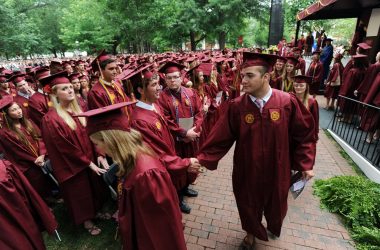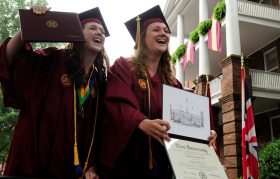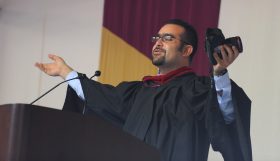Elon University conferred degrees on Saturday to 1,118 seniors in a ceremony that included remarks from acclaimed filmmaker and alumnus Laith al-Majali ’05, who told graduates they have “all the tools and skill sets you need to stand out as global leaders.”

An estimated 10,000 people attended the May 22, 2010, ceremony Under the Oaks in front of West Hall. The event was also streamed live over the Elon web site for those unable to attend in person. The program ended right at noon, just moments before rain fell from the morning’s overcast sky.
Elon alumnus Kelli E. Palmer ‘98, president of the Elon Alumni Board, welcomed guests following the national anthem, and senior class president Jay Reno also spoke to the crowd with a message of appreciation for faculty and staff who shaped their experiences since arriving on campus in fall 2006.
“The thought of leaving Elon and diving headlong into the world is intimidating, to say the least,” Reno said before cautioning his classmates not to be too focused on the future. “As you choose which path to take in life, be conscious of the path you are on. … Celebrate today your greatness tomorrow.”
In the Commencement address, Majali shared with graduates that he pushes those around him to create things with high social value. He also stressed the importance of passion.
“For me, passion and hard work go hand-in-hand and are the keys to success. Be original. And don’t be afraid of taking on big challenges,” he said. “Give back, and be thankful for what you have.”

Majali came to Elon in 2001 as the university’s first King Hussein of Jordan Scholar. He quickly distinguished himself as a campus leader, becoming an Isabella Cannon Leadership Fellow and Elon Ambassador, and joining the Intercultural Relations Club. In the days following the 9/11 terrorist attacks, Majali served as a unifying voice during campus gatherings, sharing his Arabic culture with fellow students.
Embracing Elon’s engaged learning philosophy, Majali was active in campus media, regularly volunteering to videotape athletics events and Elon Student Television programs in addition to working on his own film projects. In 2002, he received an Aegis Award for a music video he produced about his hometown.
Majali went on to produce “Captain Abu Raed,” the first feature length film to emerge from his home country in 50 years and recipient of the World Cinema Audience Award at the prestigious Sundance Film Festival in Park City, Utah, in 2008. He was honored later in 2008 with Elon University’s Young Alumnus of the Year Award.
Leaving campus showed Majali that learning doesn’t end with a college degree. No one will force graduates to take another exam or read another book, he said, so pursue opportunities to travel and learn about other cultures. “And try to surround yourself with positive people,” he added.
In his charge to alumni to close the ceremony, Elon President Leo M. Lambert told graduates they were entering a troubled word defined by rising debt, terrorism, a “paucity of civility in public life” and a collective unwillingness to take responsibility for actions that will affect future generations.

However, he said, the Class of 2010 represents hope.
“I am optimistic that the light your generation will carry forth, that Elon’s motto, ‘Numen Lumen,’ in action can and will lead to creative thinking, new solutions, entrepreneurship and a new spirit of cooperation that will take us down better paths,” Lambert said. “Lead onward Class of 2010. “
He also asked that graduates plant the oak sapling they were to receive at the end of Commencement – a traditional gift to all alumni – and nurture its growth.
“Plant your young tree and let it serve as a reminder that you have been prepared by your education to be a strong force for good in the world. Remember, too, that we are the Phoenix and have faith in the promise of renewal and new beginnings.
“God bless and God speed. Long live Elon!”


